#anti-nutrients
Explore tagged Tumblr posts
Text
ANTI-NUTRIENTS: ARE THEY REAL AND HOW HARMFUL ARE THE EFFECTS? - MYA CARE
Everyone consumes antinutrients on a daily basis and excessive amounts may detract from health.
The below discussion summarizes potential dangers of antinutrients, who is at the highest risk and how dietary antinutrients can be reduced or neutralized.
What Are Anti-Nutrients?
Anti-nutrients are any components of food which counter the actions of nutrients. Some of them prevent nutrient uptake or utilization; while other anti-nutrients promote inflammation and damage, depleting nutrient reserves in the process. Anti-nutrients may be classified alongside other nutrients or as toxins.
0 notes
Text
Why Healthy Eaters Can End Up Unhealthy

You probably have heard that a healthy diet should include plenty of whole foods, vegetables, and fiber. But you may not be aware that many of these "health foods" can cause nutrient deficiencies, leaving you at risk of developing health issues.
After watching this course, you will know what essential vitamins and minerals support your metabolism and what steps you can take to boost your body's nutrient stores.
Click on the Link to know More!
1 note
·
View note
Text
It actually does bother me that eating is treated like spending money - that you have an allotted allowance in the form of calories that you are supposed to budget.
"How are you spending your calories?" I'm spending them on experiences. I'm spending them on time with my community, my people, those who matter to me. I'm spending them on satiating a human need. I'm spending them on the feeling of being alive and not just living.
If there is one experience that I don't want to "pay" for, it's the basic human right of comfort, security, community, and care.
#anti diet culture#fatphobia#fatphobia tw#disordered eating tw#ed tw#(just in case)#ask to tag#if i had to choose between miserable counting and recounting and reallocating calories and... eating then i'm choosing the latter#there are absolutely health conditions which warrent the *need* to count and stay in a range#but that is entirely different than the societal pressure to be within the idea of a 'right' calorie/nutrient count#if you have a health condition which is affected by food/drink then do what you must to balance your wellness and health and happiness#there is absolutely nothing wrong with that#again that is very different than society coming in and telling you what it thinks you 'should' do about yourself#i know this sounds corny but like#does it not drive you insane to obsess over numbers if you don't have to?#does it drive you insane that you're often treated like you can't or shouldn't be permitted to just live? to ENJOY living?
96 notes
·
View notes
Text
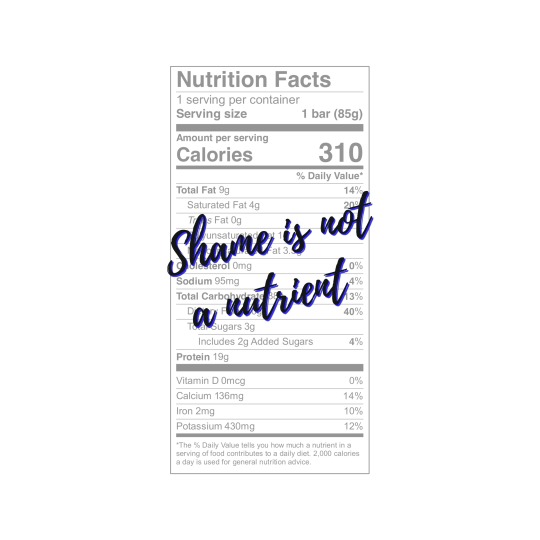

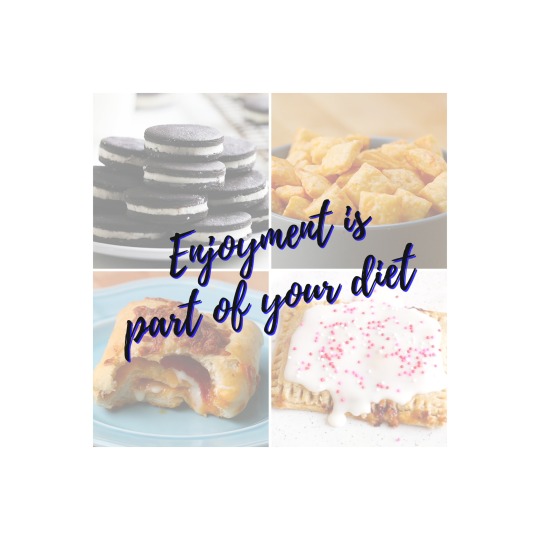

I'm adding stickers and magnets for these 4 images to my Etsy (etsy.com/shop/WilstonePrints).
Top left: "Shame is not a nutrient" in black script with a purple drop shadow, super imposed over a faded nutrition information label
Top right: "Happiness is a nutrient" in black script with a purple drop shadow, super imposed over a faded image of four snack foods
Middle: "Enjoyment is part of your diet" in black script with a purple drop shadow, super imposed over a faded image of four snack foods
Bottom: "Carbs Are BAE" in black calligraphic text, ears of wheat to left and right, potatoes above, and a loaf of bread below
#etsy#food#anti diet culture#happiness is a vital nutrient#shame is not a nutrient#enjoyment is part of your diet
84 notes
·
View notes
Text
youtube
A must watch 🙂▶️ The message, wisdom, and the bold yet respectful timbre of Zach's voice are so powerful and mesmerizing; you can clearly see that Jay is somewhat overshadowed by him. A pure bliss if you can spare the time.
#zach bush#microbioma#farming#nutrients#matrix of life#biodiversity#mitochondria#health#food#resilience#cannection to nature#soil#growing food#anti cancer#inspiration#chronic#what we eat#community#regenerative agriculture#movement#nature#water#growing#Youtube
5 notes
·
View notes
Text
Il Segreto della Salute: Guida Completa all'Alimentazione Fitness per una Vita Attiva e in Forma!"

Siete pronti ad ottenere il massimo dal vostro corpo attraverso l'alimentazione? Se sì, allora siete nel posto giusto! In questa guida vi svelerò tutti i segreti su cosa mangiare per ottenere il massimo dalle vostre performance, migliorare la vostra salute e raggiungere i vostri obiettivi di fitness.
Sapete già che l'alimentazione gioca un ruolo fondamentale nella vostra vita, ma spesso non sapete da dove cominciare o quali alimenti scegliere per ottenere i migliori risultati. Vi capisco, ci sono così tante informazioni là fuori, e molte di esse sono contraddittorie o confuse.
Ma non preoccupatevi, in questa guida vi spiegherò tutto ciò che dovete sapere in modo chiaro e semplice.
Per prima cosa, è importante capire che non esiste una dieta perfetta per tutti. Ogni persona ha bisogni nutrizionali diversi a seconda del suo peso, altezza, età, sesso, livello di attività fisica e obiettivi. Quindi, non pensate di poter seguire la stessa dieta del vostro amico o dell'atleta che vedete in televisione.

La chiave per un'alimentazione sana ed efficace per il fitness è la varietà. Dovete mangiare una vasta gamma di alimenti che vi forniranno tutti i nutrienti di cui il vostro corpo ha bisogno. Ma quali sono questi alimenti?
In questa guida vi elencherò tutti gli alimenti che dovreste includere nella vostra dieta, come frutta e verdura, carboidrati, proteine, grassi sani, vitamine e minerali.
Ma non è sufficiente solo mangiare gli alimenti giusti, è anche importante conoscere le porzioni e il momento giusto per mangiarli. Vi insegnerò come calcolare il vostro fabbisogno calorico e come suddividere i pasti durante la giornata in modo da ottimizzare le prestazioni e il recupero muscolare.

E cosa dire degli integratori? Sono necessari? Se sì, quali dovreste prendere? In questa guida vi spiegherò tutto ciò che dovete sapere sugli integratori e se sono utili per raggiungere i vostri obiettivi di fitness.
Infine, vi darò alcuni consigli pratici su come organizzare la vostra dieta e il vostro allenamento in modo da ottenere i migliori risultati possibili. Vi spiegherò come evitare i cibi spazzatura, come preparare i pasti in anticipo e come rimanere motivati durante il vostro percorso di fitness.
Insomma, questa guida sarà la vostra guida completa all'alimentazione per il fitness. Non ve ne pentirete!
Non vedo l'ora di condividere con voi tutte le mie conoscenze e di aiutarvi a raggiungere i vostri obiettivi di fitness. Siete pronti? Allora scaricate subito la guida e cominciamo insieme questo fantastico viaggio verso la vostra migliore versione.

Introduzione:
Perché l'alimentazione fitness è così importante per la salute?
Cosa significa "fitness" e come si raggiunge?
Il ruolo dell'alimentazione nel raggiungimento dei tuoi obiettivi di fitness
Capitolo 1: Fondamenti dell'Alimentazione Fitness
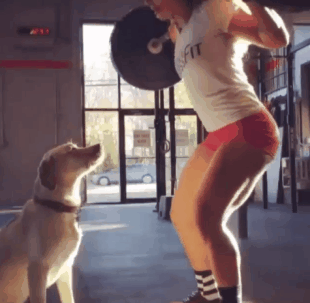
L'importanza delle macro e micro-nutrienti per il tuo corpo
Come calcolare il tuo fabbisogno calorico giornaliero
Le differenze tra calorie vuote e nutrienti densi
Alimenti che dovresti evitare e perché
Come fare scelte alimentari sane anche quando sei fuori casa
Capitolo 2: Alimentazione Fitness per la Perdita di Peso

Come creare un deficit calorico per la perdita di peso
La verità sui carboidrati e le proteine
Cibi che ti aiutano a sentirsi sazio e soddisfatto
Consigli per la pianificazione dei pasti per la perdita di peso
Capitolo 3: Alimentazione Fitness per il Guadagno di Massa Muscolare
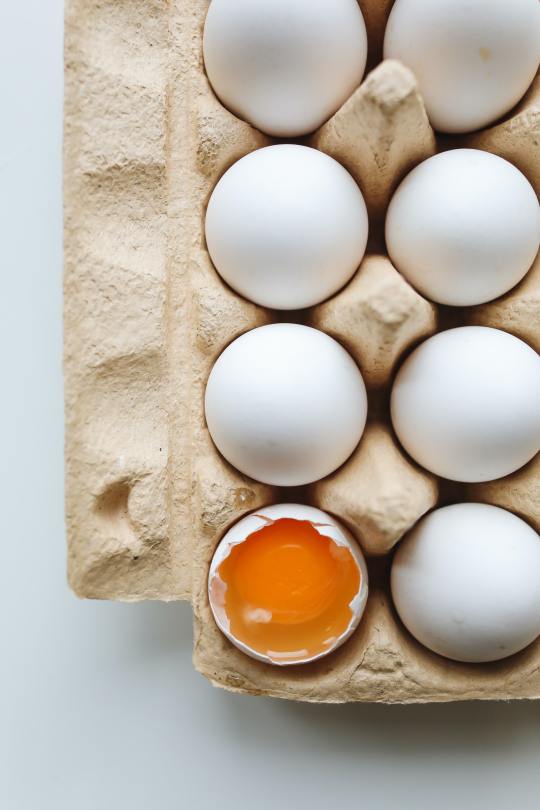
Come creare un surplus calorico per il guadagno di massa muscolare
L'importanza delle proteine per la costruzione muscolare
Cibi che aiutano a costruire massa muscolare
Come pianificare i pasti per il guadagno di massa muscolare
Capitolo 4: Alimentazione Fitness per la Salute del Cuore
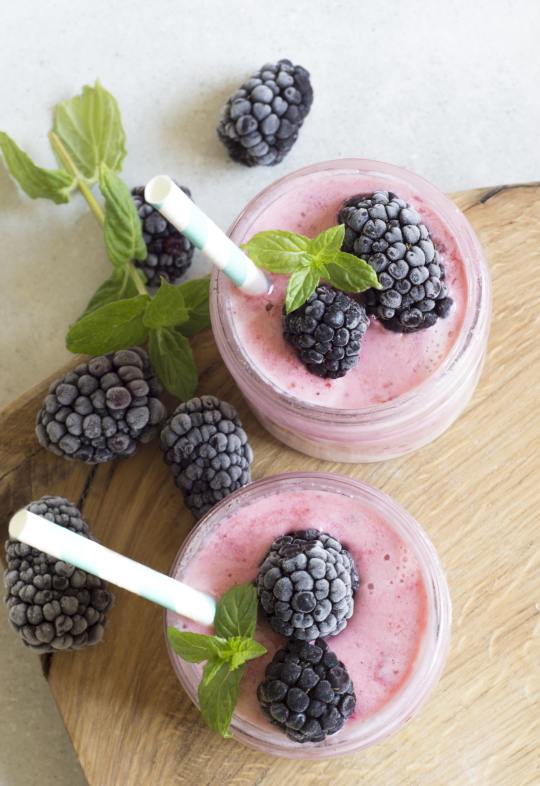
Come l'alimentazione può aiutare a mantenere un cuore sano
Cibi che aiutano a ridurre il rischio di malattie cardiache
Consigli per una dieta a basso contenuto di sodio
Come mantenere un equilibrio sano di grassi buoni e cattivi
Capitolo 5: Alimentazione Fitness per l'Energia e la Performance
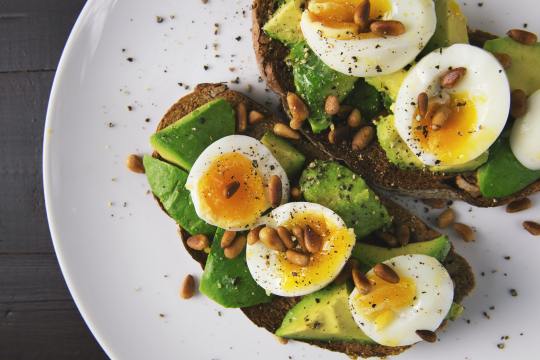
Come l'alimentazione può influire sulla tua energia e prestazioni
Cibi che ti forniscono energia duratura e sostenibile
Come mangiare per aumentare la resistenza e l'endurance
Consigli per un recupero ottimale dopo l'attività fisica
Capitolo 6: Alimentazione Fitness per una Vita Sana e Longeva

Come l'alimentazione può aiutare a prevenire le malattie croniche
Cibi che supportano la salute del cervello e del sistema nervoso
Consigli per una dieta anti-infiammatoria
Come mantenere un equilibrio sano di antiossidanti e nutrienti essenziali
Qual è la quantità di proteine di cui ho bisogno ogni giorno?
Posso mangiare carboidrati se voglio perdere peso?
Cosa posso mangiare prima e dopo l'attività fisica?
Quali alimenti aiutano a ridurre l'infiammazione nel corpo?
Posso mangiare cibi "spazzatura" ogni tanto e ancora mantenersi in forma?
L’alimentazione fitness è essenziale per il benessere del nostro corpo e della nostra mente. Non si tratta solo di mangiare cibi sani, ma anche di scegliere i nutrienti giusti per il nostro stile di vita attivo. Una dieta sana e bilanciata ci fornisce l'energia e la forza necessarie per affrontare ogni giorno con determinazione e vitalità. Quando mangiamo bene, ci sentiamo meglio, più forti e più sicuri di noi stessi.
Inoltre, l'alimentazione fitness è importante anche per la prevenzione delle malattie croniche come le patologie cardiovascolari, il diabete e l'obesità. La scelta di cibi nutrienti e salutari può aiutare a ridurre l'infiammazione nel nostro corpo, migliorare la salute del cuore e del cervello, e aumentare la longevità.
Infine, l'alimentazione fitness è un aspetto cruciale per il raggiungimento dei nostri obiettivi di fitness. Che tu stia cercando di perdere peso, guadagnare massa muscolare o aumentare la tua resistenza, una dieta sana ed equilibrata è la chiave per raggiungere i risultati desiderati. E non dimentichiamo che, quando si tratta di fitness, l'alimentazione rappresenta il 70% dell'equazione del successo!
Il termine "fitness" è spesso associato alla forma fisica e al benessere generale del nostro corpo. Ma il fitness è molto di più: significa raggiungere un equilibrio tra la salute fisica, mentale ed emotiva. Si tratta di avere un corpo sano e forte, ma anche una mente lucida e un cuore sereno.
Il raggiungimento del fitness non è un obiettivo facile da raggiungere, ma può essere ottenuto attraverso un lavoro costante e una disciplina ferrea. Significa impegnarsi ogni giorno nella cura del proprio corpo e della propria mente, attraverso l'esercizio fisico, la meditazione e una dieta sana ed equilibrata.
Per raggiungere il fitness, non esistono scorciatoie o soluzioni magiche: è necessario mettere in pratica un approccio olistico alla salute, che prenda in considerazione tutti gli aspetti del nostro essere. Solo così potremo vivere una vita piena, in armonia con noi stessi e con il mondo che ci circonda.
L'alimentazione gioca un ruolo fondamentale nel raggiungimento dei nostri obiettivi di fitness. Non importa quanto ci alleniamo, se non mangiamo cibi sani e nutrienti, non riusciremo mai a ottenere i risultati desiderati.
Una dieta sana ed equilibrata ci fornisce l'energia e i nutrienti necessari per affrontare le nostre attività quotidiane, ma anche per sostenere il nostro corpo durante l'esercizio fisico. I carboidrati complessi, ad esempio, ci forniscono la combustione lenta di energia di cui abbiamo bisogno per svolgere attività ad alta intensità, mentre le proteine aiutano a riparare i muscoli dopo l'allenamento.
Ma l'alimentazione non riguarda solo i macronutrienti: anche le vitamine, i minerali e gli antiossidanti presenti nei cibi svolgono un ruolo fondamentale nella nostra salute e nel raggiungimento dei nostri obiettivi di fitness. Ad esempio, la vitamina C e il ferro aiutano a mantenere l'energia durante l'esercizio fisico, mentre il calcio e la vitamina D sono essenziali per la salute delle ossa.
Insomma, mangiare bene non solo ci fa sentire meglio, ma ci aiuta anche a ottenere i risultati che desideriamo. Se vogliamo essere in forma e in salute, dobbiamo prestare attenzione a ciò che mettiamo nel nostro piatto, scegliendo cibi nutrienti e sani. Solo così potremo raggiungere i nostri obiettivi di fitness e vivere una vita piena di energia e vitalità.
CAPITOLO 1
Capitolo 1: Fondamenti dell'Alimentazione Fitness
L'alimentazione è uno dei pilastri fondamentali del fitness, ed è importante capire come nutrire il nostro corpo per ottenere i migliori risultati possibili.
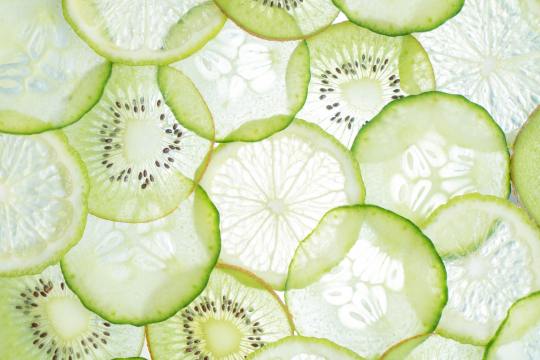
L'importanza delle macro e micro-nutrienti per il tuo corpo
Le macro e micro-nutrienti sono elementi essenziali per la nostra salute. Le macro-nutrienti come carboidrati, proteine e grassi, forniscono al nostro corpo l'energia e i nutrienti di cui abbiamo bisogno per svolgere le nostre attività quotidiane e per l'esercizio fisico. I micro-nutrienti, invece, come vitamine, minerali e antiossidanti, svolgono un ruolo importante nella nostra salute generale.
Come calcolare il tuo fabbisogno calorico giornaliero
Calcolare il fabbisogno calorico giornaliero è importante per capire quante calorie dobbiamo assumere per mantenere il nostro peso o per perdere peso. Esistono diverse formule per calcolare il fabbisogno calorico, ma è importante considerare la propria età, il peso, l'altezza, il sesso e il livello di attività fisica.

Le differenze tra calorie vuote e nutrienti densi
Le calorie vuote sono quelle provenienti da cibi che contengono pochi nutrienti essenziali per il nostro corpo, come bevande zuccherate, snack salati e cibi fritti. Al contrario, i cibi nutrienti densi forniscono al nostro corpo una vasta gamma di nutrienti, tra cui vitamine, minerali e antiossidanti, che aiutano a mantenere la salute generale.
Ci sono alcuni alimenti che dovremmo evitare, come quelli altamente processati e ricchi di zuccheri, grassi trans e sodio. Questi alimenti possono portare a problemi di salute come obesità, malattie cardiache e diabete.
Come fare scelte alimentari sane anche quando sei fuori casa
Anche quando siamo fuori casa, possiamo fare scelte alimentari sane. È importante pianificare in anticipo e portare con sé spuntini sani come frutta, frutta secca e barrette proteiche. Inoltre, quando si mangia fuori, è possibile scegliere opzioni più sane, come insalate, piatti a base di proteine magre e verdure.

CAPITOLO 2
Capitolo 2: Alimentazione Fitness per la Perdita di Peso
La perdita di peso è uno dei principali obiettivi dell'alimentazione fitness, ed è importante capire come creare un deficit calorico per ottenere i risultati desiderati.

Come creare un deficit calorico per la perdita di peso
Per perdere peso, è necessario creare un deficit calorico, ovvero consumare meno calorie di quelle che il nostro corpo brucia. È possibile creare un deficit calorico riducendo le calorie consumate o aumentando l'attività fisica. È importante creare un deficit calorico sano e sostenibile per evitare problemi di salute.
La verità sui carboidrati e le proteine
I carboidrati e le proteine sono importanti nutrienti che svolgono un ruolo chiave nella perdita di peso. È importante capire la differenza tra carboidrati complessi e semplici, e scegliere fonti di carboidrati sani come frutta, verdura e cereali integrali. Le proteine, invece, aiutano a costruire e mantenere la massa muscolare, che è importante per mantenere il metabolismo attivo.
Cibi che ti aiutano a sentirsi sazio e soddisfatto
Alcuni cibi possono aiutare a sentirsi sazi e soddisfatto per un periodo più lungo, riducendo così la fame e il desiderio di snack malsani. Questi cibi includono proteine magre, fibre, grassi sani e cibi a basso indice glicemico come frutta, verdura e cereali integrali.
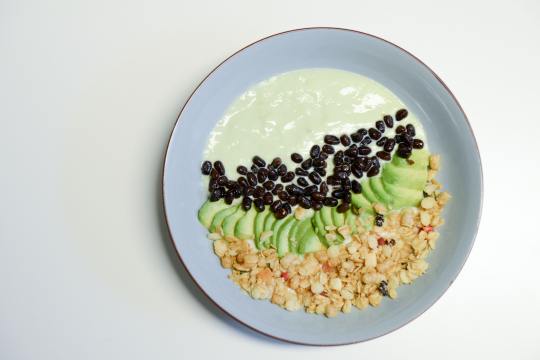
Consigli per la pianificazione dei pasti per la perdita di peso
La pianificazione dei pasti è un elemento chiave per la perdita di peso. È importante scegliere alimenti nutrienti, bilanciare i macronutrienti e tenere traccia delle calorie consumate. Inoltre, pianificare i pasti con anticipo può aiutare a evitare scelte alimentari malsane e a mantenere una dieta equilibrata e sostenibile nel tempo.
CAPITOLO 3
Capitolo 3: Alimentazione Fitness per il Guadagno di Massa Muscolare
Il guadagno di massa muscolare è uno dei principali obiettivi dell'alimentazione fitness, ed è importante capire come creare un surplus calorico per ottenere i risultati desiderati.

Come creare un surplus calorico per il guadagno di massa muscolare
Per guadagnare massa muscolare, è necessario creare un surplus calorico, ovvero consumare più calorie di quelle che il nostro corpo brucia. Tuttavia, è importante creare un surplus calorico sano e controllato, evitando di aumentare troppo rapidamente di peso e di accumulare grasso corporeo.
L'importanza delle proteine per la costruzione muscolare
Le proteine sono fondamentali per la costruzione muscolare, poiché forniscono gli aminoacidi necessari per la sintesi proteica muscolare. È importante scegliere fonti di proteine di alta qualità, come carne magra, pesce, uova, legumi e latticini.
Cibi che aiutano a costruire massa muscolare
Alcuni cibi sono particolarmente utili per il guadagno di massa muscolare, come ad esempio quelli ricchi di proteine e di carboidrati complessi. Esempi di cibi che aiutano a costruire massa muscolare sono pollo, tacchino, pesce, riso integrale, patate dolci, legumi e frutta secca.
Come pianificare i pasti per il guadagno di massa muscolare
La pianificazione dei pasti è un elemento chiave per il guadagno di massa muscolare. È importante scegliere alimenti nutrienti, bilanciare i macronutrienti e tenere traccia delle calorie consumate. Inoltre, è utile suddividere l'apporto calorico in più pasti durante la giornata per favorire la sintesi proteica muscolare.
CAPITOLO 4
Capitolo 4: Alimentazione Fitness per la Salute del Cuore
Il cuore è uno degli organi più importanti del nostro corpo. Senza di esso, non potremmo vivere. L'alimentazione gioca un ruolo fondamentale nel mantenere il nostro cuore in salute.

Innanzitutto, è importante scegliere cibi che aiutano a ridurre il rischio di malattie cardiache. Alcuni degli alimenti che dovresti includere nella tua dieta sono frutta e verdura, cereali integrali, pesce e frutta secca. Questi cibi sono ricchi di antiossidanti e nutrienti che aiutano a ridurre l'infiammazione nel corpo e proteggono il cuore.
Inoltre, è importante mantenere una dieta a basso contenuto di sodio. Il sodio è presente in molti cibi, soprattutto quelli trasformati, eccesso di sodio può aumentare la pressione sanguigna, causando problemi cardiaci. Ridurre l'assunzione di sale e scegliere alimenti freschi e non trasformati può aiutare a ridurre l'assunzione di sodio.
Infine, è importante mantenere un equilibrio sano di grassi buoni e cattivi. Molti cibi contengono grassi saturi, che possono aumentare il colesterolo "cattivo" (LDL) nel sangue. Invece, dovresti cercare di includere nella tua dieta grassi "buoni" come quelli presenti nell'olio d'oliva, nell'avocado, nelle noci e nelle mandorle, che possono aiutare ad aumentare il colesterolo "buono" (HDL) e proteggere il cuore.
In sintesi, scegliere una dieta equilibrata con cibi sani e nutrienti è fondamentale per la salute del cuore. Assicurati di includere una varietà di alimenti e ridurre l'assunzione di cibi trasformati e ricchi di sodio. Con queste semplici modifiche nella tua alimentazione, puoi fare una grande differenza nella salute del tuo cuore e del tuo corpo in generale.
CAPITOLO 5
Capitolo 5: Alimentazione Fitness per l'Energia e la Performance
L'alimentazione è un elemento fondamentale per la tua energia e le tue prestazioni fisiche. Mangiare in modo corretto può farti sentire più energico, aumentare la tua resistenza e aiutarti a recuperare più velocemente dopo l'attività fisica.

Ci sono molti cibi che possono fornirti energia duratura e sostenibile, come le verdure a foglia verde, le noci, i semi, la frutta fresca e i cereali integrali. Questi alimenti sono ricchi di nutrienti e ti aiutano a mantenere i livelli di zuccheri nel sangue costanti.
Se vuoi aumentare la tua resistenza e l'endurance, mangia cibi ricchi di carboidrati complessi, come la pasta integrale, il riso integrale, la quinoa e il pane integrale. Questi alimenti ti forniscono l'energia di cui hai bisogno per sostenere gli sforzi fisici a lungo termine.
Inoltre, per un recupero ottimale dopo l'attività fisica, è importante mangiare cibi che aiutano a ripristinare i muscoli e ridurre l'infiammazione. Le proteine magre, come il pollo, il pesce, le uova e il tofu, sono essenziali per la riparazione e la crescita muscolare. Gli alimenti ricchi di antiossidanti, come le bacche, le arance, i pomodori e i broccoli, aiutano a ridurre l'infiammazione e accelerano il recupero.
Per un'energia e prestazione al top, cerca di evitare cibi ad alto contenuto di zuccheri e grassi saturi, come i dolci, i fast food e i cibi fritti. Invece, scegli prodotti salutari e nutrienti che soddisfano i tuoi bisogni. Ad esempio, puoi optare per snack sani come frutta fresca, frutta secca, yogurt greco o hummus con carote e sedano. Assicurati di bere molta acqua durante la giornata, soprattutto prima, durante e dopo l'attività fisica. L'acqua ti aiuta ad idratarti e a mantenere l'energia necessaria per le tue performance fisiche.
Ricorda, una dieta equilibrata ed energizzante è un componente essenziale del tuo regime di fitness. Mangiare in modo sano e nutriente può aiutarti ad avere più energia, aumentare la tua resistenza e massimizzare le tue prestazioni fisiche.
CAPITOLO 6
Il capitolo 6 parla dell'importanza dell'alimentazione per una vita sana e longeva. Non è solo una questione di mangiare cibi salutari, ma di fare delle scelte che influenzano il nostro benessere fisico e mentale. È come costruire un castello, dove ogni mattoncino rappresenta una scelta alimentare fatta con cura e consapevolezza.
Ci sono cibi che aiutano a prevenire le malattie croniche come il cancro, il diabete e le malattie cardiache. E ci sono alimenti che supportano la salute del cervello e del sistema nervoso, come il pesce ricco di omega-3. Inoltre, una dieta anti-infiammatoria può aiutare a ridurre l'infiammazione nel corpo, che può essere collegata a molte malattie.

Mantenere un equilibrio sano di antiossidanti e nutrienti essenziali è fondamentale per prevenire malattie e invecchiare bene. È importante anche fare attività fisica regolare, respirare aria pulita nei parchi e nella natura, e stare attenti a dove acquistiamo i nostri prodotti alimentari. Infatti, prodotti conservati male o scaduti possono causare problemi di salute.

Vivere in grandi città come Roma, Milano o Napoli può rendere difficile trovare prodotti alimentari sani e di qualità, ma è possibile farlo con un po' di ricerca. È importante scegliere frutta e verdura fresca e di stagione, carne magra e pesce, e limitare il consumo di cibi trasformati e ad alto contenuto di zucchero e sale. Ci sono anche negozi specializzati e mercati locali che offrono prodotti di alta qualità. Ricordate, ogni scelta alimentare che facciamo può aiutare a costruire un futuro più sano e longevo.
#fitness nutrition#healthy eating#weight loss#muscle gain#heart health#energy and performance#anti-inflammatory diet#longevity#brain health#nutrient balance#meal planning#healthy cooking#grocery shopping tips#urban living and healthy eating#healthy lifestyle tips
3 notes
·
View notes
Photo
“Eevees raised by Vaporeons live longer than any other Eeveelutions, due to abundance of omega 3s and anti-cancer properties in their diet. Eeveelutions that form packs (Sylveon and Jolteon) have the most dismal life expectancies, enacting less consumption of small prey such as birds, and due to the large animals they hunt, ie red meat. The only exception to the Vaporeon rule is those raised by Leafeons, who make friends with Pokemon like Oddish who regularly groom and shed their excess roots, and Tropius, who often gift fruit.”
“Trainers should note this difference and gradually adjust the diet any wildlife Eevees they capture accordingly.”






but everything ended up just fine!
#pokémon#eeveelution#eevee#pet care#dog#cat#turns out nutrition works just about the same for dogs as is does for humans#kick red meat#white meat better#I’m not sure how much fish a dog can actually eat but since we’ve polluted them so much probably caution is warranted#humans likely do best on the Mediterranean diet because fish are similar in nutrient composition to insects- chimps love termites#anti oxidants#omega 3#nutrition
185K notes
·
View notes
Text

More Weights More Dates
"More Weights, More Dates" explores the idea that physical fitness can boost self-confidence and attract potential partners. It suggests that individuals who focus on strength training and personal health may experience increased social opportunities, both romantically and in other areas of life.
#more plates more dates#weight loss#weight gain#more plates more dates turkesterone#more plates more dates turkesterone scandal#weight lifting#how to lose weight#weights#excess weight#peptides for weight loss#weight loss diet#weight#middle weight division#weight loss motivation#i lost weight#water retention#weight training#weight loss drugs#united states anti-doping agency#body weight training#10 signs your body is lacking vital nutrients#sales
0 notes
Text
Frutas para o Coração: Alimentando a Saúde do Seu Sistema Cardiovascular
A saúde do coração é essencial para o bem-estar geral e, muitas vezes, negligenciamos como a alimentação pode impactá-la. Incorporar frutas para o coração na dieta diária é uma maneira simples e deliciosa de cuidar do sistema cardiovascular. Neste artigo, vamos explorar os benefícios das frutas que promovem a saúde do coração, como incluí-las na dieta e quais são as melhores opções para garantir…
#Alimentação balanceada#Alimentação saudável#Alimentos cardioprotetores#Alimentos para o coração#Benefícios das frutas#Benefícios naturais#Cardápio saudável#Coração saudável#Cuidados com o coração#Dicas de saúde#Frutas anti-inflamatórias#Frutas antioxidantes#Frutas antioxidantes naturais#Frutas cítricas#Frutas e coração#Frutas e saúde#Frutas frescas#Frutas para circulação#Frutas para colesterol#Frutas para dieta#Frutas para emagrecer#Frutas para pressão alta#Frutas ricas em fibras#Frutas ricas em nutrientes#Frutas ricas em potássio#Frutas saudáveis#Frutas vermelhas#Melhores frutas#Saúde do coração#Vitaminas para o coração
0 notes
Text
"now that you're awake, do you think the captain's gonna be happy or mad?"
"I—well, I—what? about what? I don't know anything—"
"about being alive. catch up!"
"wait, why are—where'd ferdinand come from? wait, is that the uhuru?"
"an egg, I don't know!"
"oh gosh. oh. oh gosh. are we fine?"
"now. you're welcome" - campaign: skyjacks without context
#LMAO '[the fruit] wasn't poison I was lying it was reverse poison' 'good poison?' 'yes' 'okay'#telomirage.txt#campaign skyjacks#gable has reawoken to. a lot lol#I'm crying the PSA at the end that's supposed to be anti mlms is a mess#'i like to think i put the nut in nutrients' nooo
0 notes
Text
Smorgasbord Health Column – Holding Back the Sands of Time – #Nutrients – Anti-Aging and a nutrient dense diet by Sally Cronin.
I would dearly love to hold back time, both health-wise and skin-wise and this post from Sally tells us exactly what we can eat to help maintain our youthful skin and good health…Sally has also made is easy for us with a printable list… This series will contain elements of the previous Turning Back the Clock, but over the last two years, Sally has been researching other areas where we might…

View On WordPress
#Nutrients - Anti-Aging and a nutrient dense diet by Sally Cronin#blogging#Healthy Eating#Holding Back the Sands of Time#Smorgasbord Health Column
0 notes
Text
I really
I really want to get a wellness degree and certification.
I might take a couple of courses in the future.
#i seriously had to cram a lot of health knowledge last year#because i felt unwell and really needed to improve#i started with a multivitamin and d3/k2 and magnesium for filling in nutrient gaps#then onega-3#then updating my oral care products#then nasal breathing#then intermittent fasting#good sleep#then brisk walking again#then healing my gut (still working on this and want to see what supplement I would need because I didn't want to take a lot)#then anti-inflammatory and low glycemic diet#then reverse osmosis water#then hormone and live health (i had to quit though).#then allergy testing#then psych evaluation#then skin healing and dermal microbiome.
0 notes
Text
Boosting Mitochondrial Health: How to Tame Chronic Inflammation with DAMPs Know-How
Exploring Mitochondrial Damage Signals and Practical Steps to Reduce Inflammation for Optimal Cellular Health I talk a lot about Mitochondria, as they matter. Every cell needs them, and their dysfunction is associated with all metabolic diseases, cancers, and neurodegenerative disorders. They are extra critical for energy organs like the brain and the heart. So, if our mitochondria malfunction,…
#Anti-inflammatory lifestyle tips#Boosting cellular resilience#Brain and heart energy needs#Cellular energy and mitochondria#Improving metabolic flexibility#Lowering inflammation#Metabolic health and mitochondria#Mitochondrial DAMPs#Mitochondrial dysfunction#mitochondrial health#Nutrients for mitochondria#Supporting mitochondrial function
0 notes
Text
Healthy Diet Chart for Weight Loss: A Medically-Backed Guide
Healthy Diet Chart for Weight Loss: A Medically-Backed GuideMaintaining a healthy weight is crucial for overall well-being, reducing the risk of chronic diseases, and improving quality of life. A well-planned diet is key to effective weight loss and long-term success. This article offers a medically-backed diet chart designed to promote sustainable weight loss without compromising essential…
#anti-inflammatory diet.#balanced nutrition#brown rice#caloric deficit#complex carbohydrates#egg whites#exercise for weight loss#frequent meals#fruits and vegetables#Greek yogurt#green tea for weight loss#grilled chicken#Healthy diet#hydration#lean protein#long-term health#low-calorie snacks#low-fat milk#macronutrients#micronutrients#mindful eating#nutrient-dense foods#oats#paneer salad#physical activity#portion control#processed foods#steamed vegetables#sustainable weight loss#turmeric benefits
0 notes
Text
The Importance of Gut Health: Foods and Habits to Improve Digestion
Gut health plays a crucial role in overall wellness, influencing everything from digestion and immune function to mental health and energy levels. The gut, often referred to as the “second brain,” contains trillions of bacteria and other microorganisms that work together to break down food, absorb nutrients, and protect against harmful pathogens. Maintaining a healthy gut is essential for…

View On WordPress
#anti-inflammatory foods#diet tips#digestive health#digestive issues#digestive wellness#exercise#fermented foods#fiber-rich foods#gut health#gut-brain axis#gut-friendly foods#healthy digestion#healthy gut microbiome#Hydration#hydration tips#immune system#inflammation reduction#mindful eating#mindful eating habits#nutrient absorption#prebiotics#prebiotics benefits#probiotics#probiotics benefits#Sleep#Stress management#Wellness
1 note
·
View note
Text
Take a look at this post… 'Health Benefits of Onions: A Nutritional Powerhouse.'.
0 notes